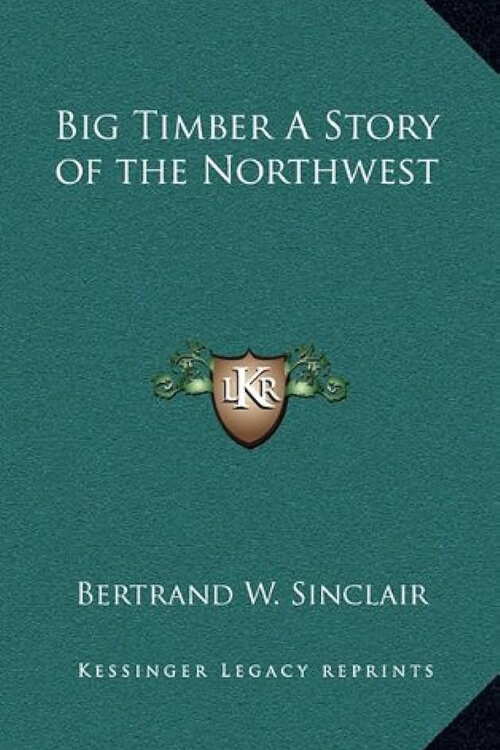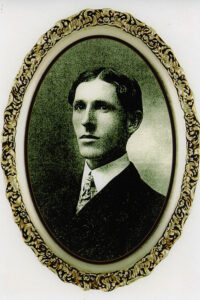
Big Timber, A Story of the Northwest
The Imperial Limited lurched with a swing around the last hairpin curve of the Yale Canyon. Ahead opened out a timbered valley,—narrow on its floor, flanked with bold mountains, but a valley,—down which the rails lay straight and shining on an easy grade. The river that for a hundred miles had boiled and snarled parallel to the tracks, roaring through the granite sluice that cuts the Cascade Range, took a wider channel and a leisurely flow. The mad haste had fallen from it as haste falls from one who, with time to spare, sees his destination near at hand; and the turgid Fraser had time to spare, for now it was but three miles to tidewater. So the great river moved placidly—as an old man moves when all the headlong urge of youth is spent and his race near run.
On the river side of the first coach behind the diner, Estella Benton nursed her round chin in the palm of one hand, leaning her elbow on the window sill. It was a relief to look over a widening valley instead of a bare-walled gorge all scarred with slides, to see wooded heights lift green in place of barren cliffs, to watch banks of fern massed against the right of way where for a day and a night parched sagebrush, brown tumble-weed, and such scant growth as flourished in the arid uplands of interior British Columbia had streamed in barren monotony, hot and dry and still.
She was near the finish of her journey. Pensively she considered the end of the road. How would it be there? What manner of folk and country? Between her past mode of life and the new that she was hurrying toward lay the vast gulf of distance, of custom, of class even. It was bound to be crude, to be full of inconveniences and uncouthness. Her brother’s letters had partly prepared her for that. Involuntarily she shrank from it, had been shrinking from it by fits and starts all the way, as flowers that thrive best in shady nooks shrink from hot sun and rude winds. Not that Estella Benton was particularly flower-like. On the contrary, she was a healthy, vigorous-bodied young woman, scarcely to be described as beautiful, yet undeniably attractive. A daughter of the well-to-do, one of that American type that flourishes in families to which American politicians unctuously refer as the backbone of the nation. Outwardly, gazing riverward through the dusty pane, she bore herself with utmost serenity. Inwardly she was full of misgivings.
Four days of lonely travel across a continent, hearing the drumming clack of car wheels and rail joint ninety-six hours on end, acutely conscious that every hour of the ninety-six put its due quota of miles between the known and the unknown, may be either an adventure, a bore, or a calamity, depending altogether upon the individual point of view, upon conditioning circumstances and previous experience.
Read or download Book
Bertrand W. Sinclair
Bertrand William Sinclair (1881–1972) was a Canadian novelist known for a series of westerns set in the United States, and also for a series of novels set in his home province of British Columbia.
Biography.
Sinclair was born 9 Jan 1881 in Edinburgh, Scotland, U.K. He was the son of George Bertrand and Robina (Williamson) Sinclair. His name at birth was William Brown Sinclair, but he changed it, adopting his father’s middle name as his first name. He emigrated to Canada with his mother in 1889.
At age 14 Sinclair ran away to Montana and became a cowboy for the next seven years. In 1903 he left Montana for Seattle and San Francisco, but returned to Montana, living in Great Falls for the next three years. In 1905 he first published stories. Also in 1905, he married author Bertha M. Brown, better known under her pen name (using her first husband’s last name): B. M. Bower. Bower, a very prolific novelist, taught him to write “productively” and to employ a formula. Sinclair and B. M. Bower had one daughter.
By 1908 Sinclair and Bower had moved to Santa Cruz, California. They divorced in 1912. The same year, Sinclair married his first wife’s cousin, Ruth Isabelle Miner. They had a child in 1912, a daughter. The Sinclairs moved to Vancouver, B.C., ultimately settling in Pender Harbour. Sinclair lived in Pender Harbour until his death.
Sinclair’s first series of work took place in Montana. Sinclair had disapproved of previous westerns he had read because he felt the action portrayed was far different from the lives cowboys led. When he moved to Vancouver, the settings of his works changed (except for two very late Westerns). He tended to write about social causes and worked in the timber industry before writing Big Timber. Later, before writing about the fishing industry, he worked as a commercial fisherman and then wrote Poor Man’s Rock. Later in life, from 1936 to 1966, he worked full-time as a licensed commercial fisherman.
In writing about the outdoors, Sinclair was influenced in his portrayals by Jack London. In his works treating social causes, he was influenced by Upton Sinclair, who may have been a cousin.
Over the years 1905-40 Sinclair wrote over 60 stories and 11 “novelettes”.






